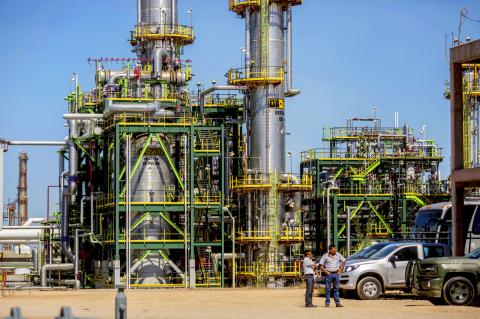Mexican President Enrique Pena Nieto on Friday said state oil company Petroleos Mexicanos (Pemex) has made a “major” oil and gas discovery with an estimated 1.5 billion barrels of crude equivalent, its largest onshore find in 15 years.
The new field, dubbed Ixachi-1, is located in the eastern state of Veracruz near existing Pemex infrastructure, meaning it can be tapped “relatively soon, and at low costs,” Pena Nieto said.
The estimated volume makes it “the largest onshore find the company has made in the past 15 years,” he said to applause from invitees at an event in the central state of Hidalgo.

Photo: Bloomberg
The field’s proven, probable and possible reserves — an estimation of the amount of oil and gas that can be brought to market near-term — are 350 million barrels, the president said.
Pemex said the size of the find might prove to be larger, or even double.
However, industry experts urged caution.
“It’s very early to talk about reserves... More work needs to be done to see how big it is,” said Gonzalo Monroy of Mexico City energy consultancy GMEC.
Although, any new find is good news for Pemex, Mexico’s largest company, which has struggled with declining production in recent years, he said.
“Pemex has discovered that there is still considerable exploration potential” in Mexico, he said. “That is good news for private industry and for the country.”
Mexico enacted a landmark energy reform in 2014 that reopened the oil and gas sector to foreign investors after 76 years of state monopoly, seeking to breathe new life into it.
As a result, Pemex now faces private competition.
It reported a loss of US$5.3 billion in the third quarter, as production fell by 12 percent from the same period last year, to 1.9 million barrels per day.

Taiwan Semiconductor Manufacturing Co (TSMC, 台積電) secured a record 70.2 percent share of the global foundry business in the second quarter, up from 67.6 percent the previous quarter, and continued widening its lead over second-placed Samsung Electronics Co, TrendForce Corp (集邦科技) said on Monday. TSMC posted US$30.24 billion in sales in the April-to-June period, up 18.5 percent from the previous quarter, driven by major smartphone customers entering their ramp-up cycle and robust demand for artificial intelligence chips, laptops and PCs, which boosted wafer shipments and average selling prices, TrendForce said in a report. Samsung’s sales also grew in the second quarter, up

On Tuesday, US President Donald Trump weighed in on a pressing national issue: The rebranding of a restaurant chain. Last week, Cracker Barrel, a Tennessee company whose nationwide locations lean heavily on a cozy, old-timey aesthetic — “rocking chairs on the porch, a warm fire in the hearth, peg games on the table” — announced it was updating its logo. Uncle Herschel, the man who once appeared next to the letters with a barrel, was gone. It sparked ire on the right, with Donald Trump Jr leading a charge against the rebranding: “WTF is wrong with Cracker Barrel?!” Later, Trump Sr weighed

LIMITED IMPACT: Investor confidence was likely sustained by its relatively small exposure to the Chinese market, as only less advanced chips are made in Nanjing Taiwan Semiconductor Manufacturing Co (TSMC, 台積電) saw its stock price close steady yesterday in a sign that the loss of the validated end user (VEU) status for its Nanjing, China, fab should have a mild impact on the world’s biggest contract chipmaker financially and technologically. Media reports about the waiver loss sent TSMC down 1.29 percent during the early trading session yesterday, but the stock soon regained strength and ended at NT$1,160, unchanged from Tuesday. Investors’ confidence in TSMC was likely built on its relatively small exposure to the Chinese market, as Chinese customers contributed about 9 percent to TSMC’s revenue last

LOOPHOLES: The move is to end a break that was aiding foreign producers without any similar benefit for US manufacturers, the US Department of Commerce said US President Donald Trump’s administration would make it harder for Samsung Electronics Co and SK Hynix Inc to ship critical equipment to their chipmaking operations in China, dealing a potential blow to the companies’ production in the world’s largest semiconductor market. The US Department of Commerce in a notice published on Friday said that it was revoking waivers for Samsung and SK Hynix to use US technologies in their Chinese operations. The companies had been operating in China under regulations that allow them to import chipmaking equipment without applying for a new license each time. The move would revise what is known